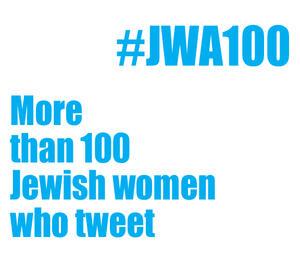The #JWA100
Something exciting happened on Twitter yesterday. The result is the #JWA100. Unlike the #JTA100, the #JWA100 is not a contest. It does not measure or rank tweeters, nor is it limited to100 people. The #JWA100 is simply a list of more than 100 Jewish women who tweet -- and it's still growing.
In 2009, JWA (@jwaonline) was ranked number 12 on JTA’s list of the 100 Most Influential Jewish Twitterers (#JTA100) in the “Jewish Organizations” category. In 2010, we didn’t make the list at all. So, when @itsdlevy and @thewanderingjew (both on this year’s list) urged me to do a gender/demographic analysis of the list, I had mixed feelings. It’s hard to know the gender of a Twitter user by their handle, and even if women were underrepsented on the list, we could come off sounding like sore losers if we cried “sexism” about a contest we lost. But thanks to the persistence of @itsdlevy and @thewanderingjew, I decided we should do something. I wasn’t exactly sure what I was going to do, but I began asking for names of Jewish women who tweet.
It took a little while, but the responses started pouring in. In only a few hours I had over 50 names. It was exciting to see spheres of influence emerge like exploding Venn diagrams as individuals recommended women in their circle, and then each of those women recommended other names in their circles, and so on.
I was shocked to realize just how many Jewish women we (@jwaonline) weren’t following! It was thrilling to make so many new connections. Why hadn’t I done this earlier? The best part was that others shared my excitement. At one point, someone asked if I would create a Twitter list of the names I had compiled so that everyone could follow this group of Jewish women. Of course I would! It was around this point that I playfully began calling my list the “#JWA100.”
While the #JWA100 list was growing, the #JTA100 list was simultaneously generating a lot of controversy on Twitter. JTA hosted an online discussion of the metrics behind the contest. Things were starting to get heated between those who approved and those who disapproved of JTA’s methodology, or of the list’s overall significance in the first place. This was in striking contrast to the love-fest happening in our corner as folks generously lauded their female friends and colleagues and made new connections. I had purposefully kept the “goal” of the list vague; after watching the bickering over the #JTA100, I resolved to keep it that way.
In a way, the difference between these two conversations is indicative of the contrast between the purpose of social media and our attempts to measure it. As a “social media professional” (or “specialist” according to my job title), I am perpetually frustrated by the way social media evades simple evaluation. But I am even more frustrated by the way we try to force evaluations and measurements onto social media. Programs like Twitalyzer and Klout process data in complex algorithms to determine “influence.” But can “influence” really be measured in numbers? Even when we gather data, it can be difficult to determine if it’s actually meaningful.
To repeat: the #JWA100 list is NOT a contest. It includes Jewish women of any nationality (even though the Jewish Women’s Archive generally focuses on North America). It is open to Jewish women who tweet about Jewish stuff and those who tweet about not-so-Jewish stuff. There are no metrics or rankings. It’s not even restricted to 100 names; in fact, it will continue to grow. The #JWA100 is about building a community of Jewish women using Twitter to make connections and have conversations. Isn’t that the whole point of social media?
@jwaonline may not have made the #JTA100 this year, but we did make connections with more than 100 Jewish women who tweet. And that’s something I’m not even going to try to quantify.
Click here to view and/or follow the #JWA100 list on Twitter.
If you are just hearing about the #JWA100 now, feel free to submit the names of more Jewish women who tweet (even yourself!) by using the hashtag #JWA100.
Note: Those with protected tweets will have to accept the follow request from @jwaonline before they can be added. If a name was left off the list, be assured it was by accident! Get in touch to make sure it's added.








The link to the Sisterhood post about @itsdlevy's post on Jewschool about Debbie Friedman is unrelated to this post about the #JWA100 and sounds, unfortunately, like a misguided personal attack.
It's completely valid to disagree with Levy's post and discuss your views in an appropriate forum; it is not constructive, however, to trash him and (and his litany of good works) on unrelated blog posts.
So, when @itsdlevy and @thewanderingjew (both on this yearÌ¢âÂã¢s list) urged me to do a gender/demographic analysis of the list, I had mixed feelings. ItÌ¢âÂã¢s hard to know the gender of a Twitter user by their handle, and even if women were underrepsented on the list, we could come off sounding like sore losers if we cried Ì¢âÂÒsexismÌ¢âÂå about a contest we lost. But thanks to the persistence of @itsdlevy
It's nice you have men who can lead you like itsdlevy. If dlevy told you to out a gay person, would you all do that as well?
You guys are terrific. An amazing asset to women and to the Jewish people B'vracha, Elana